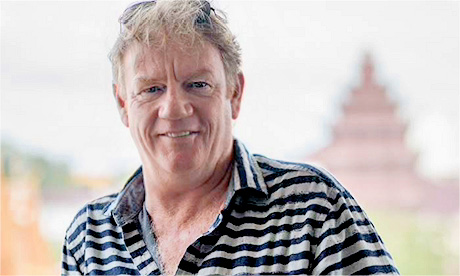Economics is too often under-estimated as a pillar of social cohesion. Southeast Asia’s growth is slowing alongside that of its biggest investor, China.
And that will test a region united by a trading bloc but divided by religion, ethnicity, and forms of government.
Potentially, the dangers are many. Indonesia experienced this harsh reality when it was beset by anti-Chinese riots in the aftermath of the 1997/98 Asian financial crisis.
More than 1,000 people died, 168 cases of rape were reported, and long-serving dictator Suharto was ousted.
Severe inflation, food shortages, and widespread unemployment were the harbingers of protests across the region as the contagion spread.
This is a danger the 10-members of the Association of South East Asian Nations (ASEAN) are acutely conscious of.
Today, economies are in much better shape than they were at the turn of the century, but growth is slowing, interest rates are rising, markets are volatile, and fears of a global recession later this year, or early next, are being stoked by the trade war between China and the United States.
Supply chains
Billions of dollars in tariffs imposed on Chinese goods by U.S. President Donald Trump is exacerbating the Chinese mainland’s economic slowdown with growth in GDP expected to slow to about 6 percent this year.
That might sound reasonable compared with GDP expectations of between 1-3 percent in Western countries, but in China, as a developing country with 400 million poor people — where double-digit growth year after year was long the norm — it’s a worrying figure.
This marks the weakest outlook for China in 30 years and that will directly hurt the more advanced economies in ASEAN — Singapore, Malaysia, Thailand — which are integral to Chinese supply lines as component manufacturers in areas such as electronics, white goods, and vehicle production.
Moody’s noted recently that these countries are increasingly focused on social welfare and more inclusive growth conducive to social cohesion. However, their responses have sharply differed.
Singapore, where the economy has deteriorated faster than expected, is foreshadowing higher taxes to pay for aged care and to maintain living standards.
For the same reasons, Malaysia has abandoned its goods and services tax.
With an election slated for March 24, Moody’s also noted that Thailand faces “high political risks” after four years of military rule. During the Asian financial crisis, Bangkok escaped the type of nasty riots that arose elsewhere in the region, largely because of a previous history of spreading wealth.
However, under the leadership of General Prayut Chan-o-cha, Thailand is now the world’s least-fair country in terms of wealth distribution, ahead of Russia, Turkey and India. According to Credit Suisse’s annual Global Growth Report in 2018, the top 1 percent of Thais control 66.9 percent of the wealth, while the poorest 10 percent have zero.
Chinese dependents
Fearing a debt trap, Malaysia has already put the brakes on further Chinese investment.
However, Brunei, amid dwindling oil reserves, and Cambodia, Laos, and Myanmar, are Chinese dependents with an insatiable appetite for mainland investment, aid, and loans.
Their main strength is their geographical position. Beijing needs those countries for its Belt and Road Initiative, giving it access to seaports, highways and pipelines for trade, as well as for diplomatic support and military projection.
Importantly, China doesn’t quibble over human rights like Western nations, which are in the advanced stages of imposing sanctions and removing trade preferences from Cambodia and Myanmar, forcing investors and donors into the wings.
If China scales back its offshore spending as growth rates fall, these four countries could be hurt badly. And grassroots anti-Beijing resentment is a rising reality within ASEAN, further complicating traditional prejudices and animosities.
The government in Brunei’s capital, Bandar Seri Begawan, has played its Islamic credentials to seek more investment from Saudi Arabia.
But Cambodia, Myanmar and Laos — where poverty rates remain stubbornly high and violent protests are not uncommon — have limited choices if their economies hit the skids.
Why this matters
Vietnam, Indonesia, and the Philippines are also bracing for an economic downturn as ASEAN anticipates growth rates of less than 5 percent. But their economies are less exposed to China, and they have brighter export prospects in the U.S. and Europe.
Another cushion is the ASEAN Economic Community (AEC), which was launched two years ago to embrace a population of about 620 million.
Eight professions are tapped to head a free trade regime: doctors, nurses, dentists, engineers, architects, surveyors, tourism industry workers, and accountants.
The E.U. provided ASEAN with an economic role model, but the AEC lacks a central bank, its own currency, and free trade has been hobbled by heavy restrictions on the mobility of labor because of Southeast Asia’s long-standing cultural divides.
The biggest issue confronting ASEAN is its lack of unity, with each country set-apart by its ethnic, religious and political make-up.
Variously, Christianity, Buddhism, Islam, and atheism are layered with monarchy, democracy, military rule, and communism.
Atheist Vietnam has arrested people because of their spiritual beliefs, while Islam-dominated Indonesia, Malaysia, and Brunei have seen non-believers imprisoned.
Buddhist Thailand and Myanmar, as well as the Christian-dominated Philippines, contend with long-running Muslim insurgencies.
Khmer antipathy towards anything Vietnamese is near xenophobic, matching a Thai version for the Burmese. Meanwhile despite what the AEC says, a Cambodian nurse cannot get a job in Thailand.
As Michael Smiddy of Emerging Markets Consulting recently noted, the free movement of people — to bolster industry and spur economic growth — remains the “least palatable” among regional leaders.
A repeat of the Asian financial crisis is unlikely, but as economies falter, jobs dry up.
Protest movements and opposition politicians find ready-made audiences when there’s not enough to go around, and governments obfuscate on their responsibilities by playing to nationalism fueled by religious bigotry.
In such circumstances, calm heads are needed to prevent social upheaval.
- Luke Hunt is a senior opinion writer for ucanews.com. Follow him on Twitter @lukeanthonyhunt
- Image: Asia Life
